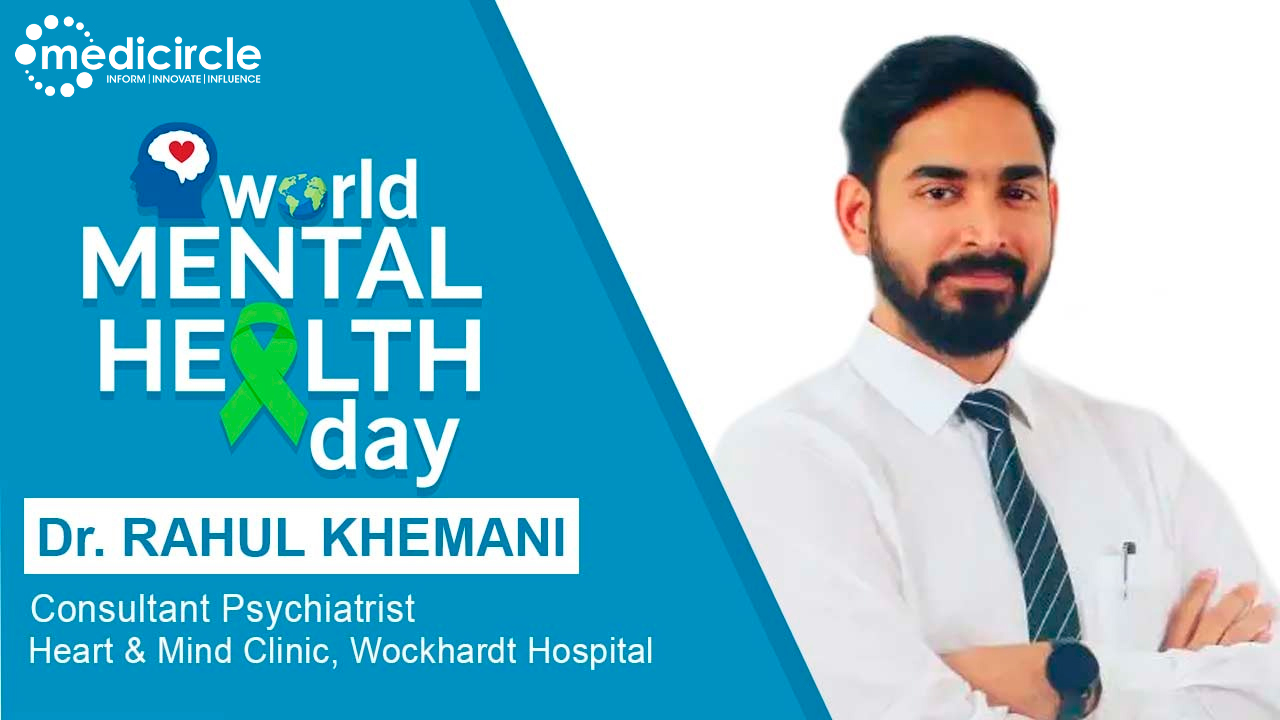Mental health matters because when we feel better, we do better. Mental health is important at every stage of our lives and impacts our thoughts, behaviors, and emotions. It plays an important part in maintaining healthy relationships and allows you to adapt to changes in your life and cope with adversity.
World Mental Health Day (WMHD) is celebrated annually on 10 October, is organized by the World Federation for Mental Health, and endorsed by the World Health Organization (WHO). COVID-19 pandemic has a major impact on people’s mental health, therefore the need to observe this day becomes even more important. It’s important to talk about mental health, so others can also come forward about it. We at Medicircle are conducting the World Mental Health Day Awareness Series to raise awareness about mental health issues that are currently affecting the world and ensure people enjoy good mental health and wellbeing.
Dr. Rahul Khemani is a consultant psychiatrist in practice for more than four years. He currently offers consultation at # in Mumbai. He is affiliated with Wockhardt Hospital, Mumbai. He has previously worked at L.T.M.G Hospital, Sion, B.Y. L. Nair Hospital, Mumbai Central, and Bhaktivedanta Hospital, Mira Road. He works with the child, adult, and geriatric population. He has a special interest in the area of child mental health, de-addiction, and psychotherapy.
What is Mental Health?
Dr. Khemani begins with an analogy, “There is this painting named ‘Elephant in the Room’ where an elephant is in the room and people around are unaware of it. They are busy scrolling on their phone and are completely distracted. The same is true for mental health. It is there but we don’t pay attention to it.”
“Just like we have the health of our physical body, similarly we have the health of the mind. When it comes to physical health we exercise and follow a good diet. Our thoughts, feelings, emotions, and behavior make up our mental health. If we take care of these four factors then we are maintaining our mental health.”
Importance of Mental Health
He explains, “Bad mental health can cause us negative thoughts, fearful and isolated behavior. It can damage our socio-relationships and performance at work. Such negative thoughts can push one to cause physical harm. That is why we shouldn’t take it for granted and instead focus on taking good breaks and spending time with our loved ones.”
Triggers for Mental Health Problems
He says, “There are triggers for mental health problems, not causes. The word trigger fits right as there are already many internal problems that have come out because of one trigger. For some, the trigger could be a work issue. Like getting reprimanded by your boss or getting bullied by your colleague. Similarly, for some, the trigger could be on a personal and relationship level. Another trigger could be a sudden change in your life, like the birth of someone or the death of loved ones. Lastly, a natural calamity like COVID or earthquake too can trigger someone.”
“Here the point-of-view and personality of the person play a key role. For someone losing a job could be a big trigger but for others, it may not be a huge deal. So the trigger varies from person to person. One shouldn’t be under the impression that a small cause is affecting them so much. Anyone can get triggered.”
Treatments for Mental Health
He mentions, “Different treatments are available for different mental health problems. Some treatments take up 1 month while others can last for 2 to 3 years. The important point here is that treatments are available. But are the patients willing to receive it?”
“Many patients are scared to receive mental illness treatments. The stigma attached to mental health can make people hesitant towards receiving such treatments. They are fearful of getting associated with words like ‘crazy’ and ‘mental’.”
In conclusion, he adds, “It is okay to not be okay. There are days when one doesn’t feel that well. That too is okay. Take some time out and meet a mental health professional, 90% of all your worries will get solved there itself.”
(Edited by Priyal Shah)

 Mental Health problem is the 'elephant in the room' we often ignore. Learn from a consultant psychiatrist how ignoring mental health problems can cause severe damage to one's work and relationships.
Mental Health problem is the 'elephant in the room' we often ignore. Learn from a consultant psychiatrist how ignoring mental health problems can cause severe damage to one's work and relationships.









.jpeg)








.png)
.png)

.png)
.png)
.png)

.png)
.png)
.png)

.png)
.png)